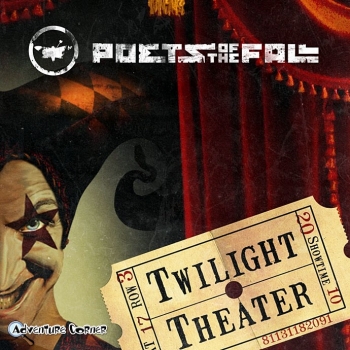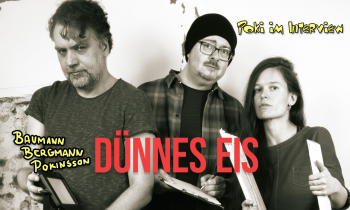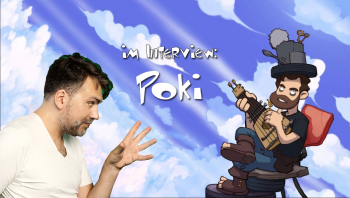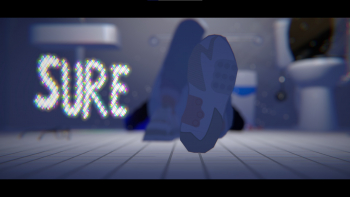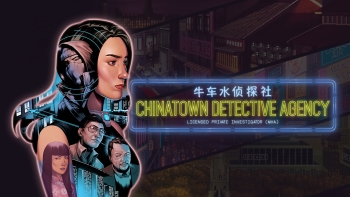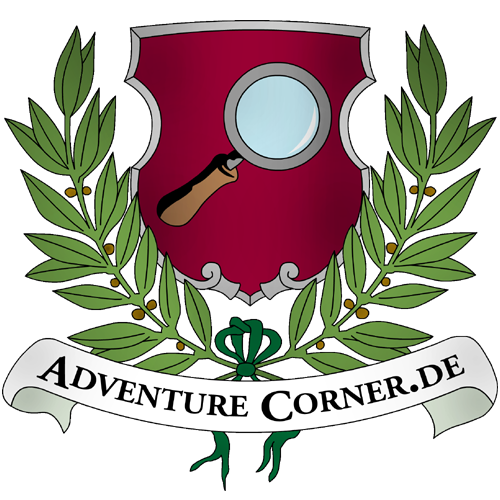The head of Franchise Development at Remedy talks about the action adventure game 'Alan Wake'.
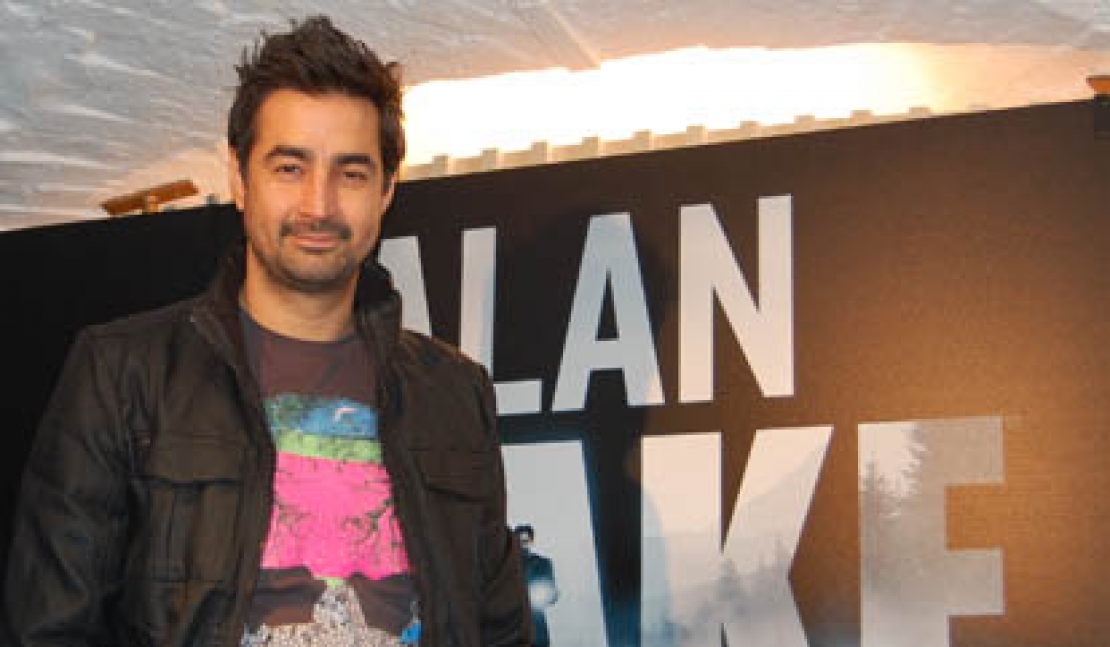
AC: Hello Oskari, thank you for taking the time for this Interview. Maybe we could start with you introducing yourself to our readers?
Oskari: Sure, my name is Oskari Häkkinen and I'm the head of Franchise Development at Remedy.
AC: How did you come to develop a "Psychological Action Thriller" after telling a classic "Film Noir" Story with Max Payne?
Oskari: That's a good question. You know, Max Payne was a long love story for Remedy as well. I mean we spent a lot of time on Max Payne. We wanted to go and try something new. We were really fortunate that after the Max Payne series, we were able to take our time prototyping and thinking of what our next project was going to be, and we came up with the concept of Alan Wake, where light and darkness play an extremely important role. Not only for the action and the combat but also for the story. But, you know, this is a Remedy game, so fans of our previous work will definitely recognize certain things that make it a Remedy game. On the one hand it's a story driven single player experience that has a very strong story to it. But on the other hand it's a cinematic movie- like action game. We learned how to use cameras in a unique way in Max Payne, and we've definitely applied some of those lessons to this game as well - but in a different way, more in a thriller way if you like. There are classic thriller moments when your enemies attack you, and you are the prey we can pan the camera back to give you a bit more time. You're still in control, but we give you a bit more time to react and to get your pulse and heart going. And we have those cinematic moments as well when your enemy is just about to attack you and you manage to dodge out of the way, it activates a cinematic dodge and that accentuates the moment and it feels really rewarding to the player. We've done that with a lot of things in Alan Wake, so you'll definitely recognize it as a Remedy game, but it's a different premise and it's a different core combat and it's a different story.
AC: Why does Alan suffer from Insomnia?
Oskari: Alan Wake hasn't managed to write anything in two years and he's had a lot of problems in life because of his problems with his work. He's having problems in his marriage and he's under a lot of stress. He's getting pressure from his wife Alice, because she wants him to write. Because when he's writing, he's happier and their marriage is better. He's also getting a lot of pressure from his literary agent. He's on commission: he wants him to write because he's not making money. He's getting a lot of pressure from the public and he's getting a lot of pressure from paparazzi as well, asking "When is your next book coming out?". He's been a successful writer of crime novels about a New York detective and they were a massive success. And after that success he hasn't been able to write. So obviously, when you're under a lot of stress, it brings on insomnia.
AC: Are you afraid of the dark?
Oskari: Personally I'm not afraid of the dark, but I can give you a little nugget of information if you like. Wake's wife, Alice, is afraid of the dark. In the start of the game, Alice tries to explain to Alan what it feels like to be afraid of the dark. And in the game Wake says that he doesn't really understand what she's trying to explain, but trying to comfort her anyway. The thing about Alan Wake is that every player that plays it will understand what it's like to be afraid of the dark.
Ulrika: Oh fun, that sounds like the kind of game for me... to play with many people around and bright lights on...
Oskari: (laughs)
AC: Horror and thriller games depend on a very intense atmosphere, how did you realize that for Alan Wake?
Oskari: I hope that we've got a very "edge of your seat" intense atmosphere; I feel it and you've just played through it, so hopefully you felt that too. There's a huge difference between horror and thriller, so it's not to say that this is fact, but my opinion is that in video games horror is more about what's actually happening on the screen: it's about the blood and the guts and what's coming after you there just at that moment. Whether it's crab monsters or whatever, it's the kind of horror that's there and it's clear and present. It's in your face. And thriller is more about things that are not necessarily happening, but you think might happen. And this can be brought about by so many different types of cues, so it can be the weather, it can be the audio cues, it can be the music, the soft violin strings that make the hairs stand up in the back of your neck. Those are the thriller moments there and it's about what you think is going to happen. Regardless whether it's going to happen or not.
AC: How important is sound design?
Oskari: Sound design is extremely important in a thriller. I mean you have to get everything right. So we have a in-house composer that did the score for Alan Wake, but just two weeks ago, and it's in this build now. We had a live orchestra in Halle in Germany and we've got the live strings in there, so the warmth of those strings really give you the cold shivers. We use Sound Deluxe, they're a partner of ours, for other audios as well. Audio is hugely important in a thriller in order to get that right atmosphere.
Will be there like a theme song, like "Last Goodbye" for Max Payne?
Oskari: Yeah, we've collaborated with Poets of the Fall again and we've even taken it one step further this time. You're going to have to play the game to find out exactly how far we've gone with the collaboration there, but definitely.
AC:Where or how did you get the inspiration for a setting like Bright Falls?
Oskari: We're not hiding it at all that we're taking a lot of influence from popular culture. We're not looking into other video games for inspiration; We look to popular culture like books and movies, comic books and graphic novels as a source of inspiration. So there's definitely an echo of Twin Peaks in Bright Falls that goes without saying, and Stephen King's work's been a huge inspiration for us. You know, a writer who's writing things that are coming true. We definitely tip our hats to some of the big names in the thriller genre like Alfred Hitchcock with the birds attacking you. These are things that resonate really well with people, because people who play video games also consume other types of media like movies or books and we have been inspired by these things but we've definitely made them our own. You recognize some of the clear and present dangers from some of the other medias that you see, and it feels even more scary when you're the person in control of the protagonist that's going through this journey.
Ulrika: I really liked that song, from that movie.
Oskari: Yes, so that movie.
We've got so many tips of the hats and stuff like that, I mean, as I said, we're huge movie buffs and we're huge TV buffs and book buffs and we've done a lot of stuff like that that people will enjoy like, that song from that movie. (sings) I love it, now it's stuck in my head.
Ulrika: It's so quirky.
Oskari: It's a quirky small town, that's what it's all about.
Ulrika: Totally adds to the atmosphere.
Oskari: It does (laughs).
AC: What do you think are the main characteristics that make Alan Wake really stand out?
Oskari: I think the fact that he's just a regular guy, he's normal, he's like any one of us, he has problems in his marriage, he has problems in his life, problems with work and so forth, so he's not a commando, navy seal or an action hero. He's someone that actually has to grow into that roll as you unravel the mystery. He's like a young Harrison Ford if you like, someone who grows into it, he's just not an action hero armed up to the teeth with everything and knows how to handle the situation at hand, it's a journey for the player, and it's a journey for Alan Wake too. As the game progresses there's a clear escalation in action as well, and as the player gets better they'll learn the role better at the same time. We've integrated that tightly into the story, as you saw in one of the action scenes I showed you in the demo, where Wake got used to the insane situation, so he's become very sarcastic and when the big Poltergeists came and he killed the last one and said "Down boy." He kind of starts to get immune to it, but at the start he's very confused. We're trying to really push the envelope in storytelling in video games here and I think we've done a really good job.
AC: There's been a lot of talk about Sandbox- gameplay beforehand. How linear is the gameplay, really?
Oskari: We have built the technology ourselves and we've built it from scratch on open world technology. Now let's be clear, it's defnitely not a free roaming sandbox gameplay, but because we have the open world technology there, it makes it possible for us to make the path that the player goes very wide, and we can make the path very long at times so the player can make their own decisions whether they want to run to a location or use a car. We've put a lot of exploration contents in there. So there is the possibility to explore because you can see quite a long distance into the world. Locations, for example: You could be standing at the top of a mountain and you might see a location that's either a location where you've been and you're remembering something horrifying that you've seen there, or we can foreshadow something for a location that you'll be in later on. So we definitely use a lot of the technology there to optimize the game.
AC: What are your plans for the future?
Oskari: We want Alan Wake to be something bigger than just one game and we certainly hope that we'll have the opportunity to take, should this be a success, to take season one of Alan Wake to season two of Alan Wake. We've planned some DLC after season one. Just to be clear, this game will have a satisfactory and conclusive ending, so when you get your hands on Alan Wake you'll be happy you've reached all your goals, and you'll be happy that you've unraveled the mystery. But just like a TV series we'll leave some doors open for a bigger story as well. And hopefully if this is a success it will give us the opportunity to open up that bigger story that we already thought of.
AC: Thank you so much for the interview!
Oskari: Sure, my name is Oskari Häkkinen and I'm the head of Franchise Development at Remedy.
AC: How did you come to develop a "Psychological Action Thriller" after telling a classic "Film Noir" Story with Max Payne?
Oskari: That's a good question. You know, Max Payne was a long love story for Remedy as well. I mean we spent a lot of time on Max Payne. We wanted to go and try something new. We were really fortunate that after the Max Payne series, we were able to take our time prototyping and thinking of what our next project was going to be, and we came up with the concept of Alan Wake, where light and darkness play an extremely important role. Not only for the action and the combat but also for the story. But, you know, this is a Remedy game, so fans of our previous work will definitely recognize certain things that make it a Remedy game. On the one hand it's a story driven single player experience that has a very strong story to it. But on the other hand it's a cinematic movie- like action game. We learned how to use cameras in a unique way in Max Payne, and we've definitely applied some of those lessons to this game as well - but in a different way, more in a thriller way if you like. There are classic thriller moments when your enemies attack you, and you are the prey we can pan the camera back to give you a bit more time. You're still in control, but we give you a bit more time to react and to get your pulse and heart going. And we have those cinematic moments as well when your enemy is just about to attack you and you manage to dodge out of the way, it activates a cinematic dodge and that accentuates the moment and it feels really rewarding to the player. We've done that with a lot of things in Alan Wake, so you'll definitely recognize it as a Remedy game, but it's a different premise and it's a different core combat and it's a different story.
AC: Why does Alan suffer from Insomnia?
Oskari: Alan Wake hasn't managed to write anything in two years and he's had a lot of problems in life because of his problems with his work. He's having problems in his marriage and he's under a lot of stress. He's getting pressure from his wife Alice, because she wants him to write. Because when he's writing, he's happier and their marriage is better. He's also getting a lot of pressure from his literary agent. He's on commission: he wants him to write because he's not making money. He's getting a lot of pressure from the public and he's getting a lot of pressure from paparazzi as well, asking "When is your next book coming out?". He's been a successful writer of crime novels about a New York detective and they were a massive success. And after that success he hasn't been able to write. So obviously, when you're under a lot of stress, it brings on insomnia.
AC: Are you afraid of the dark?
Oskari: Personally I'm not afraid of the dark, but I can give you a little nugget of information if you like. Wake's wife, Alice, is afraid of the dark. In the start of the game, Alice tries to explain to Alan what it feels like to be afraid of the dark. And in the game Wake says that he doesn't really understand what she's trying to explain, but trying to comfort her anyway. The thing about Alan Wake is that every player that plays it will understand what it's like to be afraid of the dark.
Ulrika: Oh fun, that sounds like the kind of game for me... to play with many people around and bright lights on...
Oskari: (laughs)
AC: Horror and thriller games depend on a very intense atmosphere, how did you realize that for Alan Wake?
Oskari: I hope that we've got a very "edge of your seat" intense atmosphere; I feel it and you've just played through it, so hopefully you felt that too. There's a huge difference between horror and thriller, so it's not to say that this is fact, but my opinion is that in video games horror is more about what's actually happening on the screen: it's about the blood and the guts and what's coming after you there just at that moment. Whether it's crab monsters or whatever, it's the kind of horror that's there and it's clear and present. It's in your face. And thriller is more about things that are not necessarily happening, but you think might happen. And this can be brought about by so many different types of cues, so it can be the weather, it can be the audio cues, it can be the music, the soft violin strings that make the hairs stand up in the back of your neck. Those are the thriller moments there and it's about what you think is going to happen. Regardless whether it's going to happen or not.
AC: How important is sound design?
Oskari: Sound design is extremely important in a thriller. I mean you have to get everything right. So we have a in-house composer that did the score for Alan Wake, but just two weeks ago, and it's in this build now. We had a live orchestra in Halle in Germany and we've got the live strings in there, so the warmth of those strings really give you the cold shivers. We use Sound Deluxe, they're a partner of ours, for other audios as well. Audio is hugely important in a thriller in order to get that right atmosphere.
Will be there like a theme song, like "Last Goodbye" for Max Payne?
Oskari: Yeah, we've collaborated with Poets of the Fall again and we've even taken it one step further this time. You're going to have to play the game to find out exactly how far we've gone with the collaboration there, but definitely.
AC:Where or how did you get the inspiration for a setting like Bright Falls?
Oskari: We're not hiding it at all that we're taking a lot of influence from popular culture. We're not looking into other video games for inspiration; We look to popular culture like books and movies, comic books and graphic novels as a source of inspiration. So there's definitely an echo of Twin Peaks in Bright Falls that goes without saying, and Stephen King's work's been a huge inspiration for us. You know, a writer who's writing things that are coming true. We definitely tip our hats to some of the big names in the thriller genre like Alfred Hitchcock with the birds attacking you. These are things that resonate really well with people, because people who play video games also consume other types of media like movies or books and we have been inspired by these things but we've definitely made them our own. You recognize some of the clear and present dangers from some of the other medias that you see, and it feels even more scary when you're the person in control of the protagonist that's going through this journey.
Ulrika: I really liked that song, from that movie.
Oskari: Yes, so that movie.
We've got so many tips of the hats and stuff like that, I mean, as I said, we're huge movie buffs and we're huge TV buffs and book buffs and we've done a lot of stuff like that that people will enjoy like, that song from that movie. (sings) I love it, now it's stuck in my head.
Ulrika: It's so quirky.
Oskari: It's a quirky small town, that's what it's all about.
Ulrika: Totally adds to the atmosphere.
Oskari: It does (laughs).
AC: What do you think are the main characteristics that make Alan Wake really stand out?
Oskari: I think the fact that he's just a regular guy, he's normal, he's like any one of us, he has problems in his marriage, he has problems in his life, problems with work and so forth, so he's not a commando, navy seal or an action hero. He's someone that actually has to grow into that roll as you unravel the mystery. He's like a young Harrison Ford if you like, someone who grows into it, he's just not an action hero armed up to the teeth with everything and knows how to handle the situation at hand, it's a journey for the player, and it's a journey for Alan Wake too. As the game progresses there's a clear escalation in action as well, and as the player gets better they'll learn the role better at the same time. We've integrated that tightly into the story, as you saw in one of the action scenes I showed you in the demo, where Wake got used to the insane situation, so he's become very sarcastic and when the big Poltergeists came and he killed the last one and said "Down boy." He kind of starts to get immune to it, but at the start he's very confused. We're trying to really push the envelope in storytelling in video games here and I think we've done a really good job.
AC: There's been a lot of talk about Sandbox- gameplay beforehand. How linear is the gameplay, really?
Oskari: We have built the technology ourselves and we've built it from scratch on open world technology. Now let's be clear, it's defnitely not a free roaming sandbox gameplay, but because we have the open world technology there, it makes it possible for us to make the path that the player goes very wide, and we can make the path very long at times so the player can make their own decisions whether they want to run to a location or use a car. We've put a lot of exploration contents in there. So there is the possibility to explore because you can see quite a long distance into the world. Locations, for example: You could be standing at the top of a mountain and you might see a location that's either a location where you've been and you're remembering something horrifying that you've seen there, or we can foreshadow something for a location that you'll be in later on. So we definitely use a lot of the technology there to optimize the game.
AC: What are your plans for the future?
Oskari: We want Alan Wake to be something bigger than just one game and we certainly hope that we'll have the opportunity to take, should this be a success, to take season one of Alan Wake to season two of Alan Wake. We've planned some DLC after season one. Just to be clear, this game will have a satisfactory and conclusive ending, so when you get your hands on Alan Wake you'll be happy you've reached all your goals, and you'll be happy that you've unraveled the mystery. But just like a TV series we'll leave some doors open for a bigger story as well. And hopefully if this is a success it will give us the opportunity to open up that bigger story that we already thought of.
AC: Thank you so much for the interview!
-
Alan Wake
- Entwickler
- Remedy Entertainment
- Publisher
- Microsoft
- Release
- 14. Mai 2010
- Auszeichnungen
- Adventure Corner Award
- Sprachen
-


- Systeme
-



- Stichwörter
- Alan Wake im Humble Store kaufen (Affiliate-Link)
- Alan Wake bei Amazon kaufen (Affiliate-Link)
- Alan Wake im Epic Store kaufen (Affiliate-Link)
- Schlagwort: Interviews




